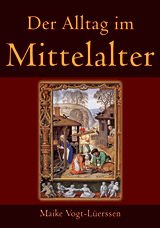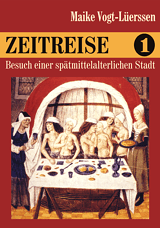Der Alltag im Mittelalter 352 Seiten, mit 156 Bildern, ISBN 3-8334-4354-5, 2., überarbeitete Auflage 2006, € 23,90
Bilder-Galerie

"… Dom Henry [Heinrich der Seefahrer], created by his father [João I. (oder Johann I.)], Duke of Viseu, and appointed Master of the Order of Christ, and governor of the kingdom of the Algarves, has left his mark on the history of the world as Prince Henry 'the Navigator.' This prince refused all the offers of the Pope, the Emperor, and of Henry V. [of England], to visit their courts, and established himself in 1418 at Sagre in order to devote himself and his wealth to the cause of discovering a continuous route by sea to India, which should bring the trade of Asia and its profits to the Portuguese." (in: H. Morse Stephens: The Story of Portugal, New York 1891, pp. 124-125). Heinrich blieb unverheiratet.

"… after winning great credit in the capture of Ceuta, he [Heinrich der Seefahrer] took up his residence at Sagre, near Cape St. Vincent, in 1418, and devoted himself to the task of maritime exploration. His father and his brothers assisted him, but they recognized his special fitness for the work, and therefore, though encouraging him as much as possible, they did not interfere with his projects, and made no attempts to contest his well-earned title of Prince Henry "the Navigator." The Prince was too wise to neglect scientific knowledge, and he therefore summoned learned mathematicians and astronomers from all parts of Europe to his aid. Enjoying immense wealth, he established an observatory and a school of navigation at Sagre, where he employed the men of science in making charts and, above all, in improving the working of the compass. … He collected together all the most daring captains and mariners he could find, and sent them forth year by year on voyages of discovery along the western coast of Africa. He never went on any of these expeditions in person, but he was acknowledged by all the men of science and sailors in his pay to be their master and presiding genius. The idea in Prince Henry’s mind was that it was possible to sail round Africa to India, and thus trade directly with the East, and he died after more than forty years of endeavour without having fulfilled his dreams." (in: H. Morse Stephens: The Story of Portugal, id., p. 141). Aber es wurden in dieser Zeit Madeira, die Kanarischen Inseln und die Azoren, Senegal, Guinea und Cape Verde entdeckt. "It was strange that Prince Henry 'the Navigator' should have been the founder of the African slave trade, but so it was … Prince Henry and the Duke of Coimbra [sein Bruder Pedro] felt the need of procuring labour to cultivate the southern provinces [of Portugal]; and it seemed quite natural to them to carry off the unfortunate savages of the African coast. This idea greatly impressed the Portuguese nobles with Prince Henry’s sagacity; they did not understand his schemes about discovering a direct route to India, but they highly appreciated the introduction of cheap forced labour. The commencement of the slave trade greatly favoured the progress of the Portuguese navigators; they no longer came home empty-handed, and exploring became a profitable as well as an adventurous business. … From this time forth the tracks made by the explorers were followed closely by the slave-dealers. Large profits were made in the trade, which had its centre at Lagos, and by the labour of the captives the great estates of southern Portugal were speedily brought under cultivation. ... The Church made no effort to restrain this traffic ..." (in: H. Morse Stephens: The Story of Portugal, id., pp. 148-150).
Heinrich starb am 13. November 1460 in Sagre. "He had not discovered a direct sea route to India, but he had paved the way for it, and it was quite certain that, if it existed, the gallant captains trained by him would find the route in time. ... it was not until the fifteenth century was within three years of its close that Vasco da Gama made his way from Lisbon to Calicut. ... In the sixteenth century the Portuguese were to have their reward. Lisbon was to take the place of Venice as the depot for all the products of the East; the trade of Persia, India, China, Japan, and the Spice Islands, was to fall into their hands, they were to produce great captains and writers, and were to become the wealthiest nation in Europe. But that same sixteenth century was to see Portuguese power to sink …. become a mere province of Spain." (in: H. Morse Stephens: The Story of Portugal, id., pp. 153/156).
Heinrich heiratete nie, aber er adoptierte seinen Neffen Fernando (oder Ferdinand) (1433-1470), einen Sohn seines Bruders Duarte I. oder Eduard I., des portugiesischen Königs, der der zweite Herzog von Viseu und Beja werden sollte.

als Buch

als Buch und als E-book

Zeitreise 1 – Besuch einer spätmittelalterlichen Stadt
als Buch, Independently published, 264 Seiten, 93 SW-Bilder, € 12,54, ISBN 978-1-5497-8302-9
und als E-Book

